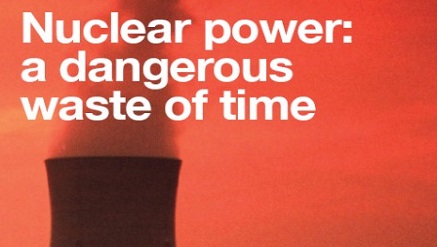General News
NUEE Oppose Nigeria, Russia Nuclear Plants Deal

National Union of Electricity Employees (NUEE) has urged the President elect, Mohammadu Buhari to resist the on-going discussions between Nigeria Atomic Energy Commission (NAEC) and Russia’s Rosatom Corporation (RRC) to build nuclear plants in Nigeria.
It recalled the unfortunate 2011 Fukushima nuclear disaster in Japan, and said that the Nigeria does not have the required capacity to manage nuclear disaster for now.
The electricity employees took cognisance of the fact that Nuclear power plants are some of the most sophisticated and complex energy systems ever designed and no matter how well it is designed and engineered, it cannot be deemed failure-proof.
“Building of nuclear plants in Nigeria will no doubt subject the citizens to unavoidable risk,” the Union told President-elect through its Comrade Joe Ajaero, general secretary, Lagos on Sunday.
He said, “We urged the President elect, Mohammadu Buhari to resist the on-going discussion between NAEC and RCC to build nuclear plants in Nigeria, as the nation, for now do not have the required capacity to manage disaster that may emanate from nuclear accident.”
Lamenting that Japan even with the high level capability in terms of human and economic power, found it extremely difficult to manage the nuclear accident, which rocked the country in 2011 and led to the death of thousands of people, Ajaero said: “We cannot turn skewed-eye to the global concerns that a combination of human and mechanical error at a nuclear facility could result in significant harm to people and the environment”.
According to him, operating nuclear reactors contain large amount of radioactive fission projects which if dispersed, can pose direct radioactive hazard, contaminate soil and vegetation, and be ingested by humans and animals. Human exposure at high enough levels can cause both short term illness and longer-term death by cancer and other diseases.
He noted that the issue of unresolved problem of radioactive nuclear waste remains a big issue as Nuclear power plants typically have high capital costs compared with other power plants.
He said in Eastern Europe, a number of long established nuclear projects are struggling to find finance, notably Belene in Bulgaria and the additional reactors at Cernavoda in Romania and some potential backer have pulled out.
General News
Kuwait Busts Nigerian Cybercrime Ring Targeting Telecom Tower, Banks

Kuwait’s Criminal Security Sector has dismantled an international cybercrime ring composed of Nigerians responsible for coordinated attacks on telecommunications towers and banks, the Ministry of Interior announced on Sunday.

According to Arabic-language daily Al Qabas, the case was initiated after the Communication and Information Technology Regulatory Authority reported cyber intrusions targeting local telecom networks.
Specialised security teams quickly launched an investigation, discovering that the suspects used advanced electronic devices to breach networks and distribute mass phishing messages impersonating banks, aiming to steal account information and siphon funds.
Signal-tracking technology led investigators to a vehicle in the Salmiya area.
When authorities attempted to stop the vehicle, the driver tried to flee, colliding with several cars before being apprehended following a fierce struggle.
A search of the vehicle uncovered sophisticated electronic equipment and various technical tools.
Upon investigation, the suspect confessed to collaborating with an accomplice to hack telecom networks and send fraudulent messages posing as banks and telecommunications companies.
Police subsequently located and arrested the second suspect, and a search of their residence uncovered additional devices used to analyse the stolen data.
Both suspects, along with the seized equipment, have been handed over to the relevant authorities for prosecution.
The Ministry of Interior reaffirmed its commitment to protecting the nation’s cybersecurity and intensifying efforts to combat electronic fraud targeting both citizens and residents.
General News
Nigerian Scientists Await Return of Egusi Seeds Sent to Space

Space in Africa, the Lagos-based firm Oniosun founded, is expecting its Egusi melon seeds to splash down in the Pacific Ocean Saturday—fresh from a trip to the International Space Station.

Once Earthside, experiments will begin on what is being hailed as the first food native to West Africa to be sent to space.
As Oniosun told AFP on Friday, it could herald an era where space exploration reflects the planet’s diversity.
“When we talk about humans colonizing other planets, this is not just an American mission or a European mission—this is a global mission,” he told AFP.
And future African space explorers might enjoy a taste of home.
Experiments on extraterrestrial food, which is to say tested in space, have been going on for years.
Growing food in space is seen as a crucial part of long-distance space flight and long-term missions, where frequent resupply won’t be feasible.
Scientists at the University of Florida in the United States, and the International Institute of Tropical Agriculture, in the southwestern Nigerian city of Ibadan, will examine the seeds “to see the effects of exposure to space” and zero gravity, including on the seeds’ DNA.
Once planted, researchers will monitor their post-space performance and germination.
The seeds went up to the ISS on a SpaceX flight last week, as part of NASA’s partnership with private firms.
Oniosun said the inclusion of Egusi seeds marked an important step forward, both for those on Earth as well as future astronauts.
High in protein, they are typically used to prepare soups and stews across West and Central Africa.
Africa’s most populous country has a small space industry, but the launch of the seeds seemed to generate more excitement on social media and in newspapers than previous launches of Nigerian satellites, he said.
“The moment that we’re sending food that they love, a food that holds significant cultural contexts to Nigeria… everybody starts getting interested in the subject,” Oniosun told AFP.
“The launch of Egusi melon seeds into space is more than a symbolic gesture,” he added.
“The future of humanity among the stars must reflect the diversity and richness of life on Earth.”
Whether pounded yam—the key dish served alongside Egusi soup—will make its way to the final frontier remains to be seen.
General News
NITDA Deepens Digital Gender Inclusion with IgniteHer Bootcamp

In a powerful demonstration of its commitment to the Renewed Hope Agenda of the present administration of President Bola Ahmed Tinubu GCFR, the National Information Technology Development Agency (NITDA) has launched the second cohort of the IgniteHer Bootcamp for Women Entrepreneurs, a strategic initiative aimed at accelerating gender inclusion and economic empowerment through digital innovation.

The bootcamp, themed “Empowering Women Entrepreneurs for Growth and Innovation”, was launched in partnership with the Japan International Cooperation Agency (JICA) and brought together selected women entrepreneurs from across Nigeria, both physically and virtually, for rigorous training in digital skills, innovation management, business development, and investor readiness.
The NITDA Director General, Kashifu Inuwa CCIE, who declared the bootcamp open, reaffirmed the Agency’s role in aligning Nigeria’s digital development with the national priorities of reforming the economy for sustained inclusive growth and accelerating economic diversification through industrialisation and digitisation.
“Through IgniteHer, we are actualising President Bola Ahmed Tinubu’s Renewed Hope Agenda by expanding women’s access to technology and economic opportunity,” he stated.
The DG, who was represented by the agency’s Acting Director of the Digital Literacy and Capacity Building department, Dr. Ahmed Tambuwal, noted that inclusive innovation is a cornerstone of NITDA’s Strategic Roadmap and Action Plan (SRAP 2.0: 2024–2027), which supports national aspirations for inclusive growth, poverty eradication, and youth empowerment.
“We are not merely imparting skills; we are creating self-reliant entrepreneurs, change-makers, and leaders,” he added.
Inuwa disclosed that the IgniteHer Bootcamp is also a key component of the National Gender Digital Inclusion Strategy (NGDIS), through which NITDA is working to empower 12.7 million Nigerian women with digital literacy skills by 2027. He averred that the programme complements broader government efforts to bridge gender gaps, enhance productivity, and reduce unemployment, especially among young women.
Citing a report by the World Wide Web Foundation, the DG emphasised that closing the digital gender gap in Nigeria could unlock an estimated $13 billion in GDP growth over the next decade.
“This training is a step towards harnessing this economic potential and ensuring that women play an integral role in shaping the digital landscape of Nigeria,” he noted.
He therefore called on participants selected from over 12,000 applicants to seize the moment and shape the future of Nigerian entrepreneurship.
While highlighting NITDA’s leadership in strategic partnerships, the DG commended JICA and the Government of Japan for their ongoing collaboration in supporting digital empowerment through programmes like IgniteHer and the iHatch Incubation Programme, which provides startup support, mentorship, and innovation development to early-stage entrepreneurs.
“At NITDA, we believe that inclusive innovation is not just an ideal but a critical strategy that ensures the growth of a stronger economy, the development of smarter solutions, and the existence of more resilient communities. Through IgniteHer, we are dismantling barriers and replacing them with pathways to opportunity,” he concluded.
In his remarks, the Japanese Ambassador to Nigeria, Matsunaga Kazuyoshi, reaffirmed Japan’s long-standing commitment to innovation and gender inclusion in Nigeria. He announced that Japan, through JICA, is currently supporting two grant projects worth $30.9 million, focused on improving Nigeria’s startup ecosystem, strengthening the investment climate, and building an inclusive innovation hub.
The Ambassador also referenced the upcoming Tokyo International Conference on African Development (TICAD 9), themed “Co-create Innovative Solutions with Africa”, as further testament to Japan’s dedication to deepening Africa-Japan cooperation on digital transformation and entrepreneurship.
Lead Facilitator of IgniteHer, Hajiya Hafsat Salabi-Dange, described the programme as a catalyst for social and economic transformation. While praising NITDA’s visionary approach to development, she stated that the programme is a movement that is bridging the digital gender divide and fostering economic independence.
Encouraging the participants to remain curious, intentional, and bold, she said, “What you will gain here goes beyond business; it is a tool for community upliftment, national growth, and generational impact.”

 Telecom2 days ago
Telecom2 days agoMTN’s mPulse Spelling Bee Returns with Regional Competitions and ₦40M in Prizes

 Telecom2 days ago
Telecom2 days agoMTN Nigeria Launches Cloud Accelerator to Power Africa’s Startup Future

 E-Business2 days ago
E-Business2 days agoArtificial Intelligence: The Indispensable Catalyst for Nigeria’s Agricultural Revolution

 Telecom2 days ago
Telecom2 days ago9mobile Rebrands as T2, Vows to Shake Up Telecom Sector

 Broadcasting2 days ago
Broadcasting2 days agoAmaarae Crowned Spotify’s EQUAL Africa Artist for August

 Telecom2 days ago
Telecom2 days agoNigeria Mulls Trust Fund to Preserve Telecom Infrastructure

 General News2 days ago
General News2 days agoNigerian Scientists Await Return of Egusi Seeds Sent to Space

 News8 hours ago
News8 hours agoGoogle Hit by AI-driven Cyber Attack























